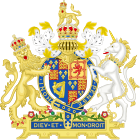| Act of Parliament | |
 | |
| Long title | An Act for disabling all persons in Holy Orders to exercise any temporal jurisdiction or authority. |
|---|---|
| Citation | 16 Cha. 1. c. 27 |
| Territorial extent | Kingdom of England |
| Dates | |
| Royal assent | 14 February 1642 |
| Commencement | 15 February 1642 |
| Repealed | 30 July 1661 |
| Other legislation | |
| Repealed by | Clergy Act 1661 |
Status: Repealed | |
| Text of statute as originally enacted | |
The Clergy Act 1640, also known as the Bishops Exclusion Act, or the Clerical Disabilities Act, was an Act of Parliament, effective 13 February 1642 that prevented men in holy orders from exercising any temporal jurisdiction or authority.
Prior to the Act, bishops of the Church of England sat in the House of Lords, where they comprised 22 out of a total membership of 60–70 peers. This allowed them to block legislation proposed by the Commons, which was increasingly dominated by Puritans.
"Puritan" was a term for anyone who wanted to reform, or 'purify', the Church of England, and contained many different sects, including Presbyterians, and Congregationalists. Despite differences in doctrine, they opposed bishops, on both religious and political grounds.
Support was limited even among moderates like Viscount Falkland, who wrote; "Those that hated the bishops, hated them more than the Devil; they who loved them, did not love them so well as their dinner."[1]
In 1649, the House of Lords was abolished by the Protectorate; it was restored in 1660, but bishops were not readmitted until the Clergy Act 1661.
- ^ Manganiello 2004, p. 60.
© MMXXIII Rich X Search. We shall prevail. All rights reserved. Rich X Search
